- North Korea could try to use the detainees as leverage for nuclear talks
- The regime surprised CNN by presenting the three men for interviews
- All three said they have signed statements admitting guilt
- Analyst: North Korea may want to use the 3 detainees in a "package deal"
(CNN) -- The setup was bizarre.
North Korean officials whisked a CNN team away in a van, purportedly to go meet with a high-ranking government official.
Hours later, they arrived in the capital and were presented with three Americans held captive in the reclusive country.

 Freelance American journalist Steven Sotloff, seen here in a photo from Facebook, disappeared during a reporting trip to Syria in August 2013. His family kept the news a secret until August 2014, when he was seen at the end of a video from the Islamic extremist group ISIS. That video showed the beheading of journalist James Foley. On Tuesday, September 2, ISIS published another video showing what appeared to be Sotloff's beheading.
Freelance American journalist Steven Sotloff, seen here in a photo from Facebook, disappeared during a reporting trip to Syria in August 2013. His family kept the news a secret until August 2014, when he was seen at the end of a video from the Islamic extremist group ISIS. That video showed the beheading of journalist James Foley. On Tuesday, September 2, ISIS published another video showing what appeared to be Sotloff's beheading.  Freelance reporter James Foley went missing in November 2012 after his car was stopped by gunmen in Syria. A video released by ISIS on August 19 showed Foley being beheaded. The video, posted on YouTube, contained a message to the United States to end its military operations in Iraq.
Freelance reporter James Foley went missing in November 2012 after his car was stopped by gunmen in Syria. A video released by ISIS on August 19 showed Foley being beheaded. The video, posted on YouTube, contained a message to the United States to end its military operations in Iraq. 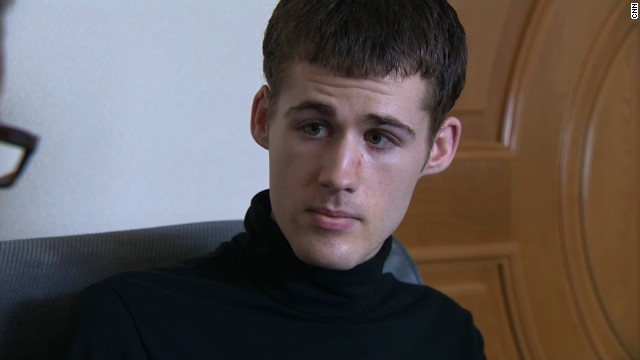 Matthew Todd Miller, one of three Americans detained in North Korea, spoke to CNN's Will Ripley on Monday, September 1, and implored the U.S. government for help. The 24-year-old is accused of tearing up his tourist visa and seeking asylum upon entry. Dressed in a black turtleneck and often avoiding eye contact, Miller told CNN he has admitted his guilt -- even though he won't learn of his charges until he goes to trial.
Matthew Todd Miller, one of three Americans detained in North Korea, spoke to CNN's Will Ripley on Monday, September 1, and implored the U.S. government for help. The 24-year-old is accused of tearing up his tourist visa and seeking asylum upon entry. Dressed in a black turtleneck and often avoiding eye contact, Miller told CNN he has admitted his guilt -- even though he won't learn of his charges until he goes to trial. 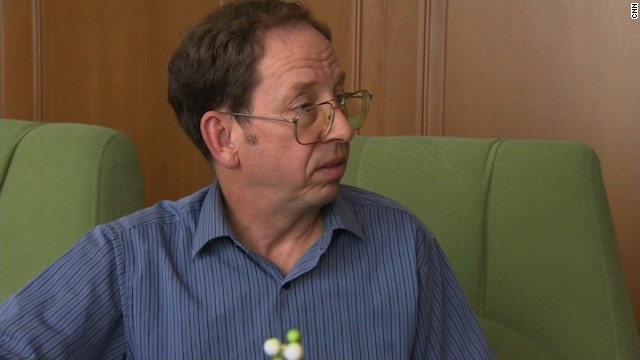 Jeffrey Edward Fowle, another one of the Americans detained in North Korea, is accused of leaving a Bible in a hotel where he was staying. North Korea announced Fowle's detention in June, saying he had violated the law by acting "contrary to the purpose of tourism." Fowle told CNN: "I've admitted my guilt to the government and signed a statement to that effect and requested forgiveness from the people and the government of the DPRK."
Jeffrey Edward Fowle, another one of the Americans detained in North Korea, is accused of leaving a Bible in a hotel where he was staying. North Korea announced Fowle's detention in June, saying he had violated the law by acting "contrary to the purpose of tourism." Fowle told CNN: "I've admitted my guilt to the government and signed a statement to that effect and requested forgiveness from the people and the government of the DPRK."  In May 2013, a North Korean court sentenced Kenneth Bae, a U.S. citizen, to 15 years of hard labor for committing "hostile acts" against the state. North Korea claimed Bae was part of a Christian plot to overthrow the regime. In a short interview with CNN on Monday, September 1, Bae said he is working eight hours a day, six days a week at a labor camp. "Right now what I can say to my friends and family is, continue to pray for me," he said.
In May 2013, a North Korean court sentenced Kenneth Bae, a U.S. citizen, to 15 years of hard labor for committing "hostile acts" against the state. North Korea claimed Bae was part of a Christian plot to overthrow the regime. In a short interview with CNN on Monday, September 1, Bae said he is working eight hours a day, six days a week at a labor camp. "Right now what I can say to my friends and family is, continue to pray for me," he said. 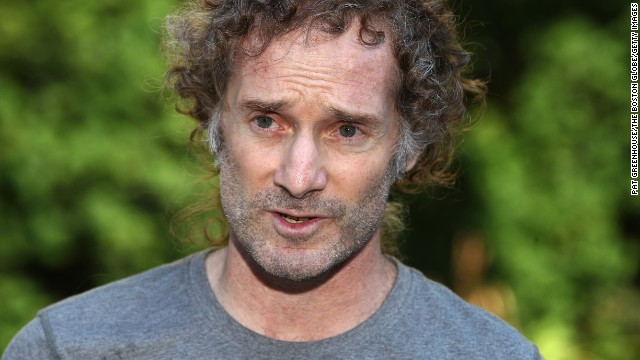 American journalist Peter Theo Curtis was handed over to U.N. peacekeepers on August 24 after nearly two years in captivity. He is believed to have been captured in October 2012 and held by the al-Nusra Front, a Syrian rebel group with ties to al Qaeda.
American journalist Peter Theo Curtis was handed over to U.N. peacekeepers on August 24 after nearly two years in captivity. He is believed to have been captured in October 2012 and held by the al-Nusra Front, a Syrian rebel group with ties to al Qaeda.  Alan Gross, at right with Rabbi Arthur Schneier, has been in Cuban custody since December 2009, when he was jailed while working as a subcontractor. Cuban authorities say Gross tried to set up illegal Internet connections on the island. Gross says he was just trying to help connect the Jewish community to the Internet. Former President Jimmy Carter and New Mexico Gov. Bill Richardson have both traveled to Cuba on Gross' behalf, but they were unable to secure his release.
Alan Gross, at right with Rabbi Arthur Schneier, has been in Cuban custody since December 2009, when he was jailed while working as a subcontractor. Cuban authorities say Gross tried to set up illegal Internet connections on the island. Gross says he was just trying to help connect the Jewish community to the Internet. Former President Jimmy Carter and New Mexico Gov. Bill Richardson have both traveled to Cuba on Gross' behalf, but they were unable to secure his release.  This undated image provided by the U.S. Army shows Sgt. Bowe Bergdahl, who had been held by insurgents in Afghanistan since 2009. The White House announced Bergdahl's release on May 31. Bergdahl was released in exchange for five senior Taliban members held by the U.S. military.
This undated image provided by the U.S. Army shows Sgt. Bowe Bergdahl, who had been held by insurgents in Afghanistan since 2009. The White House announced Bergdahl's release on May 31. Bergdahl was released in exchange for five senior Taliban members held by the U.S. military.  An Iranian court threw out a 2011 death sentence for Amir Hekmati, a former U.S. Marine charged with spying. But he was secretly retried in Iran and convicted of "practical collaboration with the U.S. government," his sister told CNN on April 11. He has been sentenced to 10 years in prison, she said. Hekmati was detained in August 2011 during a visit to see his grandmother. His family and the Obama administration deny accusations he was spying for the CIA.
An Iranian court threw out a 2011 death sentence for Amir Hekmati, a former U.S. Marine charged with spying. But he was secretly retried in Iran and convicted of "practical collaboration with the U.S. government," his sister told CNN on April 11. He has been sentenced to 10 years in prison, she said. Hekmati was detained in August 2011 during a visit to see his grandmother. His family and the Obama administration deny accusations he was spying for the CIA.  Retired FBI agent Robert Levinson has been missing since 2007. His family says he was working as a private investigator in Iran when he disappeared, and multiple reports suggest Levinson may have been working for the CIA. His family told CNN in January that they have long known that Levinson worked for the CIA, and they said it's time for the government to lay out the facts about Levinson's case. U.S. officials have consistently denied publicly that Levinson was working for the government, but they have repeatedly insisted that finding him and bringing him home is a "top" priority.
Retired FBI agent Robert Levinson has been missing since 2007. His family says he was working as a private investigator in Iran when he disappeared, and multiple reports suggest Levinson may have been working for the CIA. His family told CNN in January that they have long known that Levinson worked for the CIA, and they said it's time for the government to lay out the facts about Levinson's case. U.S. officials have consistently denied publicly that Levinson was working for the government, but they have repeatedly insisted that finding him and bringing him home is a "top" priority.  Warren Weinstein, a contractor held by al Qaeda militants, is a U.S. citizen who has been held hostage in Pakistan since August 2011.
Warren Weinstein, a contractor held by al Qaeda militants, is a U.S. citizen who has been held hostage in Pakistan since August 2011.  U.S. tourist and Korean War veteran Merrill Newman arrives at the Beijing airport on December 7, 2013, after being released by North Korea. Newman was detained in October 2013 by North Korean authorities just minutes before he was to depart the country after visiting through an organized tour. His son Jeff Newman said the Palo Alto, California, man had all the proper paperwork and set up his trip through a North Korean-approved travel agency.
U.S. tourist and Korean War veteran Merrill Newman arrives at the Beijing airport on December 7, 2013, after being released by North Korea. Newman was detained in October 2013 by North Korean authorities just minutes before he was to depart the country after visiting through an organized tour. His son Jeff Newman said the Palo Alto, California, man had all the proper paperwork and set up his trip through a North Korean-approved travel agency.  Mexican authorities arrested Yanira Maldonado, a U.S. citizen, right, in May 2013, for alleged drug possession. She and her husband, Gary, were traveling from Mexico back to the United States when their bus was stopped and searched. She was released a few days later and is now back in the United States.
Mexican authorities arrested Yanira Maldonado, a U.S. citizen, right, in May 2013, for alleged drug possession. She and her husband, Gary, were traveling from Mexico back to the United States when their bus was stopped and searched. She was released a few days later and is now back in the United States.  Saeed Abedini, a 33-year-old U.S. citizen of Iranian birth, was sentenced to eight years in prison in January 2013. He was accused of attempting to undermine the Iranian government and endangering national security by establishing home churches.
Saeed Abedini, a 33-year-old U.S. citizen of Iranian birth, was sentenced to eight years in prison in January 2013. He was accused of attempting to undermine the Iranian government and endangering national security by establishing home churches.  North Korea has arrested Americans before, only to release them after a visit by a prominent dignitary. Journalists Laura Ling, center, and Euna Lee, to her right, spent 140 days in captivity after being charged with illegal entry to conduct a smear campaign. They were freed in 2009 after a trip by former President Bill Clinton.
North Korea has arrested Americans before, only to release them after a visit by a prominent dignitary. Journalists Laura Ling, center, and Euna Lee, to her right, spent 140 days in captivity after being charged with illegal entry to conduct a smear campaign. They were freed in 2009 after a trip by former President Bill Clinton.  Former President Jimmy Carter negotiated the release of Aijalon Gomes, who was detained in 2010 after crossing into North Korea illegally from China. Analysts say high-level visits give Pyongyang a propaganda boost and a way to save face when it releases a prisoner.
Former President Jimmy Carter negotiated the release of Aijalon Gomes, who was detained in 2010 after crossing into North Korea illegally from China. Analysts say high-level visits give Pyongyang a propaganda boost and a way to save face when it releases a prisoner. 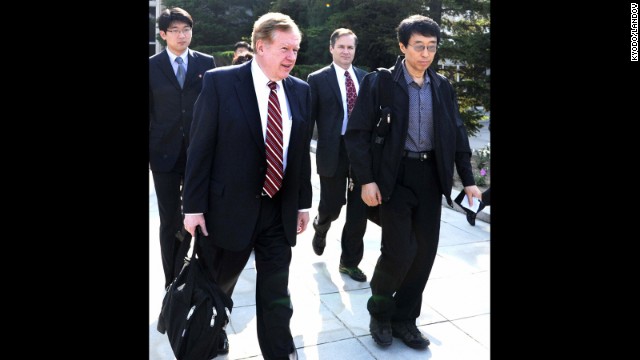 Eddie Yong Su Jun was released by North Korea a month after he was detained in April 2011. His alleged crime was not provided to the media. The American delegation that secured his freedom included Robert King, the U.S. special envoy for North Korean human rights issues.
Eddie Yong Su Jun was released by North Korea a month after he was detained in April 2011. His alleged crime was not provided to the media. The American delegation that secured his freedom included Robert King, the U.S. special envoy for North Korean human rights issues.  Robert Park was released by North Korea in 2010 without any apparent U.S. intervention. The Christian missionary crossed into North Korea from China, carrying a letter asking Kim Jong Il to free political prisoners and resign. North Korea's state-run news agency said Park was released after an "admission and sincere repentance of his wrongdoings." Here, Park holds a photo of Kim and a malnourished child during a protest in Seoul.
Robert Park was released by North Korea in 2010 without any apparent U.S. intervention. The Christian missionary crossed into North Korea from China, carrying a letter asking Kim Jong Il to free political prisoners and resign. North Korea's state-run news agency said Park was released after an "admission and sincere repentance of his wrongdoings." Here, Park holds a photo of Kim and a malnourished child during a protest in Seoul.  Josh Fattal, center, Sarah Shourd, left, and Shane Bauer were detained by Iran while hiking near the Iraq-Iran border in July 2009. Iran charged them with illegal entry and espionage. Shourd was released on bail for medical reasons in September 2010; she never returned to face her charges. Bauer and Fattal were convicted in August 2011, but the next month they were released on bail and had their sentences commuted.
Josh Fattal, center, Sarah Shourd, left, and Shane Bauer were detained by Iran while hiking near the Iraq-Iran border in July 2009. Iran charged them with illegal entry and espionage. Shourd was released on bail for medical reasons in September 2010; she never returned to face her charges. Bauer and Fattal were convicted in August 2011, but the next month they were released on bail and had their sentences commuted.  Haleh Esfandiari, an Iranian-American scholar, was detained at Iran's Evin Prison, spending months in solitary confinement before Iran released her on bail in August 2007. Esfandiari was visiting her ailing mother in Tehran when she was arrested and charged with harming Iran's national security.
Haleh Esfandiari, an Iranian-American scholar, was detained at Iran's Evin Prison, spending months in solitary confinement before Iran released her on bail in August 2007. Esfandiari was visiting her ailing mother in Tehran when she was arrested and charged with harming Iran's national security. 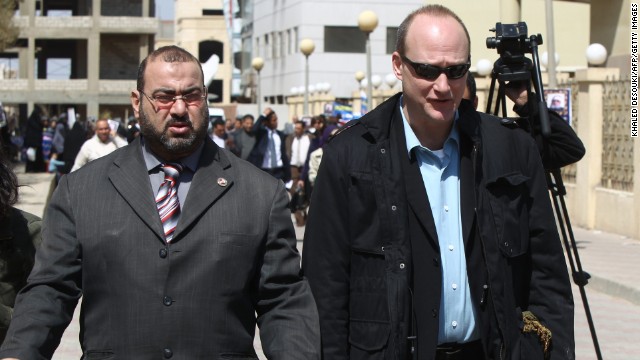 Sixteen Americans were among the dozens arrested in December 2011 when Egypt raided the offices of 10 nongovernmental organizations that it said received illegal foreign financing and were operating without a public license. Many of the employees posted bail and left the country after a travel ban was lifted a few months later. Robert Becker, right, chose to stay and stand trial.
Sixteen Americans were among the dozens arrested in December 2011 when Egypt raided the offices of 10 nongovernmental organizations that it said received illegal foreign financing and were operating without a public license. Many of the employees posted bail and left the country after a travel ban was lifted a few months later. Robert Becker, right, chose to stay and stand trial.  Filmmaker Timothy Tracy was arrested in Venezuela in April 2013 on allegations of funding opponents of newly elected President Nicolas Maduro, successor to the late Hugo Chavez. Tracy went to Venezuela to make a documentary about the political division gripping the country. He was released in June 2013.
Filmmaker Timothy Tracy was arrested in Venezuela in April 2013 on allegations of funding opponents of newly elected President Nicolas Maduro, successor to the late Hugo Chavez. Tracy went to Venezuela to make a documentary about the political division gripping the country. He was released in June 2013. Americans detained abroad
Americans detained abroad
Americans detained abroad
Americans detained abroad
Americans detained abroad
Americans detained abroad
Americans detained abroad
Americans detained abroad
Americans detained abroad
Americans detained abroad
Americans detained abroad
Americans detained abroad
Americans detained abroad
Americans detained abroad
Americans detained abroad
Americans detained abroad
Americans detained abroad
Americans detained abroad
Americans detained abroad
Americans detained abroad
Americans detained abroad
Americans detained abroad
 Photos: Americans detained abroad
Photos: Americans detained abroad  What could be up Kim Jong Un's sleeve?
What could be up Kim Jong Un's sleeve?  CNN talks with Americans held in North Korea
CNN talks with Americans held in North Korea  American wrestlers travel to North Korea
American wrestlers travel to North Korea  CNN tours Kim Jong Un's water park
CNN tours Kim Jong Un's water park Like virtually everything in Pyongyang, the interviews were carefully managed by the regime. Each man had exactly five minutes to speak. Some of their statements seemed eerily similar.
So what was the government's motive in letting Kenneth Bae, Matthew Todd Miller and Jeffrey Edward Fowle address the world?
"First of all, their motivation always behind these interviews has been to gather U.S. attention and then try to pave a way for high-level dialogue with Washington," said Ellen Kim of the Center for Strategic and International Studies.
During their interviews Monday, all three men said they hope the U.S. government will send an envoy to help get them out of their situations -- similar to how former President Bill Clinton helped secure the release of two journalists in 2009.
"I do believe that (a) special envoy need to come in order to resolve the situation I am in right now," said Bae, who is serving 15 years at a labor camp after North Korea claimed he was part of a Christian plot overthrow the regime.
What might North Korea want in return?
"Their negotiating ploy with the U.S. is to try to get us to agree to nuclear arms control, to sort of accept them as a nuclear weapons state -- which we can't do," said Michael Green of the Center for Strategic and International Studies.
Another possibility: That North Korea wants sanctions against the regime lifted.
Victor Cha, the North Korea adviser to former President George W. Bush, said the presentation of all three Americans at once could be telling.
"My guess is the fact that all three of them were put on tape for an American audience on Labor Day as a signal from the North Koreans that they're looking for some sort of package deal to try to get them all out," Cha said.
"Whether they're trying to connect this to the long-style nuclear negotiations is anybody's guess."
Washington responds
The detainees' surprise interviews with CNN's Will Ripley on Monday prompted renewed calls out of Washington for the men's release.
"Out of humanitarian concern for Jeffrey Fowle, Matthew Miller, and their families, we request the DPRK release them so they may return home," State Department spokeswoman Jen Psaki said, using the initials for North Korea's official name -- the Democratic People's Republic of Korea.
She said the United States is in "regular, close coordination" with the Swedish Embassy in Pyongyang, which acts as the "protecting power for issues involving U.S. citizens in North Korea."
But it's apparent the three men are now being used by North Korea as "bargaining chips," said Bill Richardson, a former U.S. ambassador to the United Nations who has traveled to the isolated country.
"They're sending a signal, saying, 'We're ready to bargain for the three hostages,'" Richardson said.
What the detainees said
All three men said they have signed statements admitting their guilt. North Korean officials monitored and recorded all three interviews, and CNN was unable to assess independently the conditions under which the men were being held.
Bae said he is working eight hours a day, six days a week at a labor camp, even though he said his health has "been failing" over the past 1½ months. The 46-year-old has diabetes, high blood pressure and kidney stones.
Despite what he called "hard labor," Bae said he has been treated "as humanely as possible."
U.S. officials have repeatedly called on North Korea to release Bae, but to no avail.
Even former basketball star Dennis Rodman, who has visited North Korea and called its ruler Kim Jong Un a "friend for life," asked Kim to "do me a solid and cut Kenneth Bae loose."
Terri Chung, Bae's sister, told CNN on Monday the video of his interview was "really difficult to watch."
"It is clear from the video that he is under a lot of stress. And he talks about his health failing and being in complete isolation for almost two years. And it is devastating for our family to see that on TV."
She also released a statement asking the North Korean authorities to have mercy.
"It is in your power to release my brother. You could do it today. Please do so," Chung said. "He has confessed to the crimes for which he has been charged, and he has served a longer detainment than any other American since the war."
Miller: 'My situation is very urgent'
Dressed in a black turtleneck and often avoiding eye contact, Miller said he has admitted his guilt -- even though he won't learn of his charges until he goes to trial.
"But I will say that I prepared to violate the law of the DPRK before coming here," Miller told Ripley.
The 24-year-old is accused of tearing up his tourist visa and seeking asylum upon entry.
He expressed frustration that "there's been no movement from my government."
Miller said he wanted to tell the United States that "my situation is very urgent, that very soon I am going to trial, and I would directly be sent to prison."
"I think this interview is my final chance to push the American government into helping me," he said.
Fowle describes 'desperate situation'
Fowle, an American tourist accused of leaving a Bible in a hotel where he was staying, said he has "no complaints" about his treatment.
"It's been very good so far, and I hope and pray that it continues, while I'm here two more days or two more decades," the 56-year-old said.
North Korea announced Fowle's detention in June, saying he had violated the law by acting "contrary to the purpose of tourism."
"The charges are violations of DPRK law, which stems from me trying to leave a Bible," Fowle told Ripley.
"It's a covert act and a violation of tourists rules. I've admitted my guilt to the government and signed a statement to that effect and requested forgiveness from the people and the government of the DPRK."
Fowle said with his trial expected to begin within a month, he is getting desperate.
"You guys should convey my desperate situation," he said. "I've got a wife and three elementary school-aged kids that depend on me for support."
Read: What North Korea wants the world to see
CNN's Elise Labott, Barbara Starr and Brianna Keilar contributed to this report.
No comments:
Post a Comment